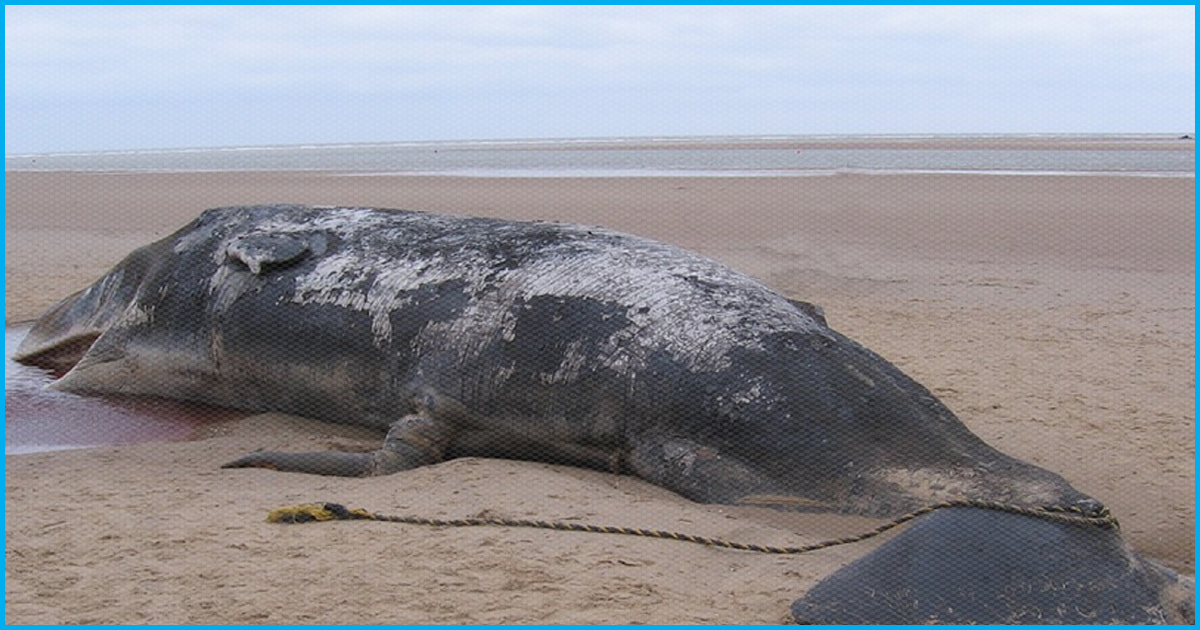The adverse effects of plastic pollution in oceans are getting more visible day by day with the discovery of 6 kg of plastic in the stomach of a dead sperm whale that washed ashore in Indonesia on November 19.
Rescuers from Wakatobi National Park in eastern Indonesia found the carcass of the 9.5m (31 feet) whale near the park in Southeast Sulawesi province. They were tipped off by environmentalists who told them that the villagers nearby had found the body and were chopping it up.
Plastic plastic everywhere
The discovery of plastic in the whale’s stomach has shocked environmentalists. Items found included 115 drinking cups, four plastic bottles, 25 plastic bags and two flip-flops.
“Although we have not been able to deduce the cause of death, the facts that we see are truly awful,” Dwi Suprapti, a marine species conservation coordinator at WWF Indonesia, was quoted as saying by the Associated Press, reported BBC.
Although they said that they cannot ascertain the cause of death, they say that plastic might have triggered it. The WWF posted on Twitter a list of the things found in the whale’s stomach.
5,9 kg sampah plastik ditemukan di dlm perut paus malang ini! Sampah plastik yaitu: plastik keras (19 pcs, 140 gr), botol plastik (4 pcs, 150 gr), kantong plastik (25 pcs, 260 gr), sandal jepit (2 pcs, 270 gr), didominasi o/ tali rafia (3,26 kg) & gelas plastik (115 pcs, 750 gr). pic.twitter.com/ZFWZgkbnzu
— WWF-Indonesia (@WWF_ID) November 19, 2018
Amid the crisis of plastic pollution growing in the world, this comes as worrying news. Marine life has been compromised because of the presence of plastic in oceans. Stray animals like cows, dogs consume plastic and die. Recently, the body of a dead pilot whale washed ashore in Thailand which had died after consuming 80kgs of plastic.
Yet Another Whale Dies After Consuming Plastic
A five-day effort to save a pilot whale ended in vain; The whale found off the Thailand coast had swallowed nearly eight kgs of plastic
Posted by The Logical Indian on Monday, June 4, 2018
Plastic pollution is also an issue as most countries do not have proper waste disposal system. In 2016 it was seen that the water around the coastal village of Muara Angke in Jakarta displayed a multitude of colours — from black to green and white — owing to the massive pollution levels.
Plastic trash can be found floating like hundreds of jellyfishes. Tonnes of soda bottles, diapers, wrappers, etc. float on the surface. The water can’t be seen for miles. Jakarta is generating mountains of trash each day, and most of it gets disposed into the water due to the lack of a waste management system. Muara Angke is drowning in plastic trash. Plastic is on every footpath and patch of sand.
The Logical Indian Take
“Researchers Find 12,000 Pieces Of Microplastic Per Litre Of Arctic Ice”
“80-Kg Polythene Waste Removed From Cow’s Stomach After A Three-Hour Surgery”
“Pacific Garbage Patch Is Now Three Times The Size Of France”
These are a few news headlines from the past couple of months. No matter how much we try to deny it, over the course of time, plastic has become a part and parcel of our lives and it is destroying the environment one microparticle at a time.
While we have been made to believe that plastic is an indispensable part of our lives, it is destroying everything around us. According to UN data, about one million plastic drinking bottles are purchased every minute around the world. Also, up to 5 trillion single-use plastic bags are used worldwide every year. This means that almost half of the plastic created in the world is thrown away after a single-use.
All this plastic now ends up either in landfills or in the ocean. The marine life is heavily endangered because of plastic. Reports of aquatic animals dying of plastic pollution are increasing every day. A study from 2015 found around 44,000 incidences of animals getting entangled in plastic debris since the 1960s. Plastic, that disintegrates into smaller pieces, are often eaten by smaller fish, which then ultimately end up in our stomach. That is carcinogenic for human beings. Please, save the earth and say no to plastic.
Also Read: Researchers Find 12,000 Pieces Of Microplastic Per Litre Of Arctic Ice












